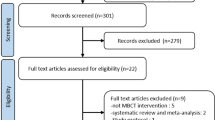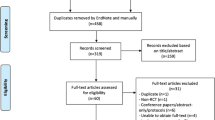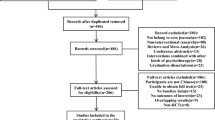Abstract
Objective
This study aims to evaluate the treatment effect of a mindfulness-based intervention for Chinese breast cancer patients across outcome domains, including symptom-related, psychosocial, and quality of life outcomes.
Methods
Following the Cochrane Systematic Review guideline, we searched across five electronic databases, reference lists of eligible studies, professional websites, and major academic journals in Chinese. Publication bias was assessed using funnel plot and Vevea and Woods sensitivity analysis, and risk of bias was evaluated using the revised Cochrane risk of bias tool for randomized trials and risk of bias in non-randomized studies of interventions. A meta-analysis of Hedges’ g was conducted using meta-regression with robust variance estimation.
Results
Final analysis included a total of 45 controlled trials containing 286 effect size estimates. Across outcome domains, studies reported an overall large and statistically significant treatment effect, d = 0.921, 95% CI (0.805, 1.040), p < 0.001. Subgroup analyses of specific domains of outcome reported overall significant treatment effects for (1) symptom-related outcomes, d = 0.885, 95% CI (0.657, 1.110), p < 0.001; (2) psychosocial wellness outcomes, d = 0.984, 95% CI (0.879, 1.090), p < 0.001; and (3) quality of life, d = 0.990, 95% CI (0.776, 1.200), p < 0.001. Moderator analysis did not identify any significant moderator.
Conclusion
Chinese literature reported an overall statistically significant and large treatment effect of a mindfulness-based intervention for breast cancer patients in China. Except for physical symptom outcomes, e.g., nausea/vomiting and pain, a mindfulness-based intervention was effective across outcome domains among Chinese breast cancer patients.


Similar content being viewed by others
References
Winters S, Martin C, Murphy D, Shokar NK (2017) Breast cancer epidemiology, prevention, and screening. Prog Mol Biol Transl Sci 151:1–32
Bray F, Ferlay J, Soerjomataram I, Siegel RL, Torre LA, Jemal A (2018) Global cancer statistics 2018: GLOBOCAN estimates of incidence and mortality worldwide for 36 cancers in 185 countries. CA Cancer J Clin 68(6):394–424
Chen W, Zheng R (2015) Incidence, mortality and survival analysis of breast cancer in China. Chin J Clin Oncol 13:668–674
Gianni L, Pienkowski T, Im YH, Tseng LM, Liu MC, Lluch A et al (2016) 5-year analysis of neoadjuvant pertuzumab and trastuzumab in patients with locally advanced, inflammatory, or early-stage HER2-positive breast cancer (NeoSphere): a multicentre, open-label, phase 2 randomised trial. Lancet Oncol 17(6):791–800
Park EH, Min SY, Kim Z, Yoon CS, Jung KW, Nam SJ et al (2017) Basic facts of breast cancer in Korea in 2014: the 10-year overall survival progress. J Breast Cancer 20(1):1–11
Campbell-Enns HJ, Woodgate RL (2017) The psychosocial experiences of women with breast cancer across the lifespan: a systematic review. Psycho-Oncology. 26(11):1711–1721
Fiszer C, Dolbeault S, Sultan S, Brédart A (2014) Prevalence, intensity, and predictors of the supportive care needs of women diagnosed with breast cancer: a systematic review. Psycho-Oncology. 23(4):361–374
Lam WW, Au AH, Wong JH, Lehmann C, Koch U, Fielding R, Mehnert A (2011) Unmet supportive care needs: a cross-cultural comparison between Hong Kong Chinese and German Caucasian women with breast cancer. Breast Cancer Res Treat 130(2):531–541
Pillai US, Kayal S, Cyriac S, Nisha Y, Dharanipragada K, Kamalanathan SK et al (2019) Late effects of breast cancer treatment and outcome after corrective interventions. Asian Pac J Cancer Prev 20(9):2673
Wanchai A, Armer JM (2020) A systematic review association of reflexology in managing symptoms and side effects of breast cancer treatment. Complement Ther Clin Pract 38:101074
Miller KD, Siegel RL, Lin CC, Mariotto AB, Kramer JL, Rowland JH et al (2016) Cancer treatment and survivorship statistics, 2016. CA Cancer J Clin 66(4):271–289
Tao JJ, Visvanathan K, Wolff AC (2015) Long term side effects of adjuvant chemotherapy in patients with early breast cancer. Breast 24:S149–S153
Carlson LE, Zelinski EL, Toivonen KI, Sundstrom L, Jobin CT, Damaskos P, Zebrack B (2019) Prevalence of psychosocial distress in cancer patients across 55 North American cancer centers. J Psychosoc Oncol 37(1):5–21
Fallowfield L, Jenkins V (2015) Psychosocial/survivorship issues in breast cancer: are we doing better? J Natl Cancer Inst 107(1):dju335
Naik H, Leung B, Laskin J, McDonald M, Srikanthan A, Wu J et al (2020) Emotional distress and psychosocial needs in patients with breast cancer in British Columbia: younger versus older adults. Breast Cancer Res Treat 179(2):471–477
Hashemi SM, Rafiemanesh H, Aghamohammadi T, Badakhsh M, Amirshahi M, Sari M, Behnamfar N, Roudini K (2020) Prevalence of anxiety among breast cancer patients: a systematic review and meta-analysis. Breast Cancer 27(2):166–178
Pilevarzadeh M, Amirshahi M, Afsargharehbagh R, Rafiemanesh H, Hashemi SM, Balouchi A (2019) Global prevalence of depression among breast cancer patients: a systematic review and meta-analysis. Breast Cancer Res Treat 176(3):519–533
Ai ZP, Gao XL, Li JF, Zhou JR, Wu YF (2017) Changing trends and influencing factors of the quality of life of chemotherapy patients with breast cancer. Chin Nurs Res 4(1):18–23
Finck C, Barradas S, Zenger M, Hinz A (2018) Quality of life in breast cancer patients: associations with optimism and social support. Int J Clin Health Psychol 18(1):27–34
Creswell JD (2017) Mindfulness interventions. Annu Rev Psychol 68:491–516
Eisenlohr-Moul T, Peters JR, Baer RA (2015) How do mindfulness-based interventions work? Strategies for studying mechanisms of change in clinical research. Handbook of mindfulness and self-regulation. Springer, New York, NY, pp 155–170
Zhang A, Hu R, Wang K, Antalis EP (2020) Age moderates the association between psychological distress and engagement in mindfulness among cancer patients and survivors: a population-based study. J Psychosoc Oncol 38(5):513–526
Greer JA, Park ER, Prigerson HG, Safren SA (2010) Tailoring cognitive-behavioral therapy to treat anxiety comorbid with advanced cancer. J Cogn Psychother 24(4):294–313
Landa-Ramírez E, Greer JA, Sánchez-Román S, Manolov R, Salado-Avila MM, Templos-Esteban LA, Riveros-Rosas A (2020) Tailoring cognitive behavioral therapy for depression and anxiety symptoms in Mexican terminal cancer patients: a multiple baseline study. J Clin Psychol Med Settings 27(1):54–67
Cramer H, Lauche R, Paul A, Dobos G (2012) Mindfulness-based stress reduction for breast cancer—a systematic review and meta-analysis. Curr Oncol 19(5):e343
Huang HP, He M, Wang HY, Zhou M (2016) A meta-analysis of the benefits of mindfulness-based stress reduction (MBSR) on psychological function among breast cancer (BC) survivors. Breast Cancer 23(4):568–576
Zainal NZ, Booth S, Huppert FA (2013) The efficacy of mindfulness-based stress reduction on mental health of breast cancer patients: a meta-analysis. Psycho-Oncology. 22(7):1457–1465
Zhang Q, Zhao H, Zheng Y (2019) Effectiveness of mindfulness-based stress reduction (MBSR) on symptom variables and health-related quality of life in breast cancer patients—a systematic review and meta-analysis. Support Care Cancer 27(3):771–781
Cifu G, Power MC, Shomstein S, Arem H (2018) Mindfulness-based interventions and cognitive function among breast cancer survivors: a systematic review. BMC Cancer 18(1):1163
Haller H, Winkler MM, Klose P, Dobos G, Kuemmel S, Cramer H (2017) Mindfulness-based interventions for women with breast cancer: an updated systematic review and meta-analysis. Acta Oncol 56(12):1665–1676
Zhang J, Xu R, Wang B, Wang J (2016) Effects of mindfulness-based therapy for patients with breast cancer: a systematic review and meta-analysis. Effects of mindfulness-based therapy for patients with breast cancer: a systematic review and meta-analysis. Complement Ther Med 26:1–10
DeSantis CE, Ma J, Goding Sauer A, Newman LA, Jemal A (2017) Breast cancer statistics, 2017, racial disparity in mortality by state. CA Cancer J Clin 67(6):439–448
Alagoz O, Ergun MA, Cevik M, Sprague BL, Fryback DG, Gangnon RE et al (2018) The University of Wisconsin breast cancer epidemiology simulation model: an update. Med Decis Mak 38(1S):99S–111S
Gomez SL, Clarke CA, Shema SJ, Chang ET, Keegan TH, Glaser SL (2010) Disparities in breast cancer survival among Asian women by ethnicity and immigrant status: a population-based study. Am J Public Health 100(5):861–869
Chen MS (2005) Cancer health disparities among Asian Americans: what we know and what we need to do. Cancer. 104(S12):2895–2902
Wen KY, Fang CY, Ma GX (2014) Breast cancer experience and survivorship among Asian Americans: a systematic review. J Cancer Surviv 8(1):94–107
Vevea JL, Woods CM (2005) Publication bias in research synthesis: sensitivity analysis using a priori weight functions. Psychol Methods 10(4):428
Higgins JP, Thomas J, Chandler J, Cumpston M, Li T, Page MJ, Welch VA (eds) (2019) Cochrane handbook for systematic reviews of interventions. John Wiley & Sons, Hoboken, New Jersey
Sterne JA, Hernán MA, Reeves BC, Savović J, Berkman ND, Viswanathan M, ..., Carpenter JR (2016) ROBINS-I: a tool for assessing risk of bias in non-randomised studies of interventions. BMJ. 355
Cooper H, Hedges LV, Valentine JC (2019) The handbook of research synthesis and meta-analysis, 3rd edition. Russell Sage Foundation
Hedges LV, Tipton E, Johnson MC (2010) Robust variance estimation in meta-regression with dependent effect size estimates. Res Synth Methods 1(1):39–65
Tipton E, Postejovsky JE (2015) Small-sample adjustments for tests of moderators and model fit using robust variance estimation in meta-regression. J Educ Behav Stat 40(6):604–634
Amaro A (2015) A holistic mindfulness. Mindfulness. 6(1):63–73
Availability of data and material
Data can be made available upon request from the corresponding author.
Code availability
Code can be made available upon reasonable request from the corresponding author.
Author information
Authors and Affiliations
Contributions
Shijie Jing: conceptualization; data curation; investigation; project administration; supervision; validation; writing the original manuscript
Anao Zhang: conceptualization; formal analysis; methodology; project administration; supervision; writing the original manuscript
Yuying Chen: data curation; investigation; validation
Changyi Shen: data curation; investigation; validation
Jennifer Currin-McCulloch: conceptualization; validation; writing the original manuscript
Chenfang Zhu: validation; writing the original manuscript
Corresponding author
Ethics declarations
Ethics approval
This is a systematic review and meta-analysis; thus, IRB approval is not applicable here.
Consent to participate
Not applicable.
Consent for publication
Not applicable.
Conflict of interest
The authors declare no conflict of interest.
Additional information
Publisher’s note
Springer Nature remains neutral with regard to jurisdictional claims in published maps and institutional affiliations.
Rights and permissions
About this article
Cite this article
Jing, S., Zhang, A., Chen, Y. et al. Mindfulness-based interventions for breast cancer patients in China across outcome domains: a systematic review and meta-analysis of the Chinese literature. Support Care Cancer 29, 5611–5621 (2021). https://doi.org/10.1007/s00520-021-06166-0
Received:
Accepted:
Published:
Issue Date:
DOI: https://doi.org/10.1007/s00520-021-06166-0




